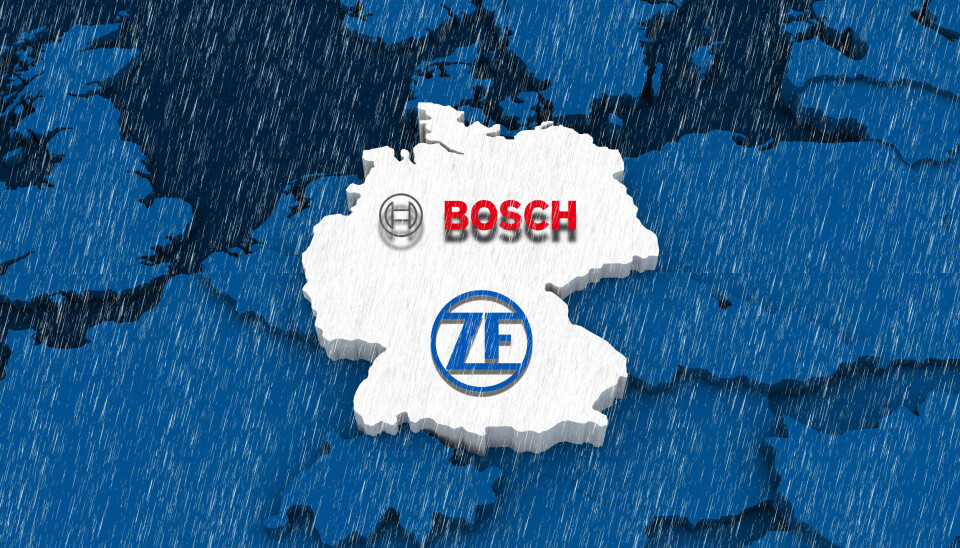Workforce Restructuring
German auto giants face major job cuts

Bosch and ZF Friedrichshafen announce over 20,000 job reductions amid market challenges and global competition.
The current of decline now defines Germany's automotive supply industry. Within a week of each other, two of the nation's most formidable industrial enterprises have announced job reductions that together will eliminate more than 20,000 positions, exposing structural vulnerabilities that extend far beyond cyclical market weakness.
Robert Bosch, the world's largest automotive supplier, revealed on 25th September plans to cut 13,000 positions at its mobility division, seeking to close a €2.5bn ($2.94bn) cost gap. Days later, ZF Friedrichshafen announced 7,600 redundancies within its electrified drivetrain division, signalling a strategic retreat from certain electrification ambitions. The announcements arrive against a backdrop of 55,000 jobs already shed across Germany's automotive sector since 2023, with suppliers bearing the brunt of adjustment.
The cost equation tilts against Europe
What distinguishes this moment from previous cycles is the confluence of pressures bearing down simultaneously. Bosch cited "subdued development" in global vehicle markets, but the real challenge lies deeper. The company faces US President Donald Trump's 15 per cent tariff on European exports, a levy that, whilst modest compared with duties imposed elsewhere, nonetheless erodes already thin margins. Meanwhile, Chinese competitors have achieved cost structures that European suppliers struggle to match.
"The global vehicle market continues to see subdued development," Bosch stated, though this understates the structural nature of the challenge. Stefan Grosch, member of the Bosch board of management and director of industrial relations, acknowledged the gravity: "Regrettably, we will not be able to avoid further job cuts beyond those already communicated. This hurts us greatly, but unfortunately there is no alternative."
The 13,000 reductions add to 9,000 cuts previously announced, representing approximately 3 per cent of Bosch's 418,000-strong global workforce. Roles across several departments, including production will be affected across German sites including Feuerbach, Schwieberdingen, Waiblingen, Bühl and Homburg. Notably, UK operations remain untouched, though the company pledged to "continually assess" operations based on customer demand.
ZF's pivot from pure electrification
At ZF Friedrichshafen, the cuts carry particular strategic significance. The company's electrified drivetrain division, its largest by both employment and revenue with approximately 30,000 workers, will shed more than a quarter of its workforce by 2030. Yet the redundancies accompany a more fundamental shift: ZF will halt development of electric vehicle products whilst redirecting investment towards plug-in hybrid drivetrains.
"We need to get through this," chief executive Mathias Miedreich said at a press conference on 1st October. "It's a joint effort to make our products more competitive on the cost side and also to lift revenues."
The tier supplier now weighs purchasing electric motors and inverters rather than manufacturing them internally, potentially partnering with Chinese suppliers operating in Europe. Miedreich expressed preference for manufacturing cooperation over component purchasing to preserve employment, but the direction of travel appears clear. Plans to spin off the electrified drivetrain division, which also produces range extender technology and automatic transmissions, have been abandoned.
Labour leaders sanctioned the reductions, part of a broader programme announced earlier to eliminate as many as 14,000 positions this decade. Additional measures include delayed wage increases and reduced working hours in Germany, collectively targeting more than €500m ($588m) in cost savings by 2027.
Failing to act means the future of automotive will not be built in Europe. This isn't only about factories closing, it threatens the industry's social fabric and Europe's technological sovereignty
The burden of past acquisitions and impact on production
ZF's predicament partly reflects strategic choices made during more optimistic times. The privately held company, 94 per cent owned by the Zeppelin trust fund operated by the city of Friedrichshafen, embarked on costly acquisitions throughout the past decade that loaded its balance sheet with debt. Most notably, the $7bn takeover of US braking systems specialist Wabco Holdings in 2020 now appears mistimed. All of this has, of course, a direct impact on automotive production; the bedrock of automotive.
In April, S&P Global Ratings downgraded ZF's credit rating to BB- whilst maintaining a stable outlook based on expectations of gradual operational recovery. Three months later, ZF warned that falling global car production was eliminating substantial portions of its savings achievements. The leadership turmoil surrounding these difficulties culminated last month when the company ousted chief executive Holger Klein mere days after he met German Chancellor Friedrich Merz at the Munich IAA auto show. Miedreich, formerly head of the electrified drive division, assumed the chief executive role on 1st October.
An industry calling for protection
The scale of dislocation has prompted calls for policy intervention. The European Association of Automotive Suppliers (CLEPA) now advocates for local content rules ensuring cars built in Europe incorporate significant shares of regionally manufactured components. The association argues suppliers currently face costs as much as 35 per cent higher than global competitors.
"Failing to act means the future of automotive will not be built in Europe," CLEPA secretary general Benjamin Krieger said in an emailed statement. "This isn't only about factories closing, it threatens the industry's social fabric and Europe's technological sovereignty."
Whether such protectionist measures materialise remains uncertain. What cannot be disputed is the velocity of change confronting Germany's automotive supply base. The industry that anchored German manufacturing prosperity for generations now confronts existential questions about competitiveness, strategic positioning and the viability of its traditional business model in an era of rapid technological transition and intensifying global competition.
ZF ranks fourth on the Automotive News list of the top 100 global suppliers with worldwide sales to automakers of $37.3bn during its 2024 fiscal year. That Bosch and ZF, two such formidable enterprises, find themselves compelled to such drastic restructuring suggests the pressures afflicting Germany's automotive sector will intensify before they ease.





